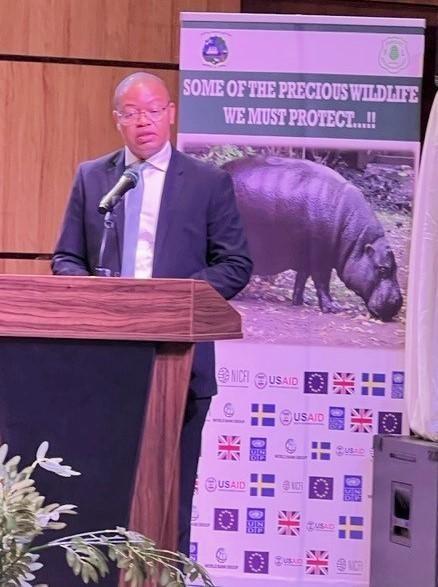“Liberia Must Preserve Its Forests”

—World Bank Country Manager urges gov’t
World Bank Liberia Country Manager, Khwima Nthara, has said that climate finance has the potential to contribute to the national budget of Liberia.
Nthara said climate finance is very important to finance critical development programs and the delivery of social services. But to maximize its climate finance, Liberia must reserve its forests.
He made the remark recently at a two-day Liberia Forest and Climate Resilience Forum, held at the Ministerial Complex in Congo Town.
Nthara said: "So, on behalf of the World Bank Group family, it is a great honor for me to be participating in this two-day Liberia Forest and Climate Resilience Forum, whose objective is to catalyze partnerships and renew political commitments and broad interest at the highest level in sustainable forest management and climate resilience as a key strategy for supporting Liberia’s pro-poor agenda for prosperity and development,"
According to him, the World Bank Group’s mission in its member countries is to help them achieve the twin goals of ending extreme poverty and boosting shared prosperity.
In Liberia, Nthara said, these twin goals are very much aligned with the government’s pro-poor agenda for prosperity and development (PAPD).
He further suggested that to reduce poverty and promote shared prosperity, it requires the identification of all the available pathways for reducing poverty and promoting shared prosperity and what needs to be done to maximize the opportunities along those pathways.
Nthara said that across the world, the forest sector has been identified as one possible pathway for helping countries reduce poverty and promote shared prosperity.
"It is estimated that about 350 million people who live within or close to dense forests depend on them for their subsistence and income." He continued, "Forests are an important aspect of rural livelihoods, with rural households living near forested areas deriving as much as 22 percent of their income from forest sources, according to the World Bank’s Poverty and Environment Network (PEN)."
Nthara said that forests support rural economies in many countries and create jobs and wealth for populations with few alternative off-farm employment options. Forests produce more than 5,000 types of wood-based products and generate an annual gross value addition of over US$600 billion, or about 1% of global GDP; in some countries, that contribution is much higher.
He noted that the forest sector has a crucial role in ensuring sustainability to reduce poverty and promote shared prosperity through its contribution to reducing climate change.
Speaking on deforestation, Nthara added, "Forest degradation and land use change contribute about 12% of the world’s greenhouse gas emissions, and many of the world’s remaining forests are under increasing threat due to agriculture expansion, timber extraction, fuelwood collection, and other activities."
He said, therefore, the critical role that the forest sector can play towards ensuring climate resilience globally has opened up new opportunities for countries like Liberia that still have vast forest cover.
Nthara indicated that Liberia stands to benefit significantly from significant climate financing if it does the right thing.
He said, “the government of Liberia has already started taking some basic steps towards protecting the country’s vast forest cover. "We know this because we at the World Bank have been supporting the government’s efforts to protect Liberia’s forests through the Liberia Forest Sector Project, with grant financing from the Norwegian Government."
"We are all aware that other development partners in this room have been supporting the government of Liberia in the forest sector,"
Nthara also disclosed that much more still needs to be done for Liberia to take full advantage of opportunities available in the forest sector, and in particular, through climate financing.
"During this forum, we are therefore also hoping to hear the participants’ take on where exactly Liberia stands in this journey, especially what more needs to be done." "We also look forward to hearing about what Liberia can learn from other countries that have already benefited from these opportunities," he urged.
Nthara said the most important steps for Liberia to take to maximize opportunities in the forest sector through its contribution to climate resilience will be to actually implement the actions that will be identified during this forum and presented in a clear road map.
He, therefore, promises the continuous support of the World Bank Group and other development partners in helping to implement these actions.
Nthara also expressed the hope that the road map from the forum will include some low hanging fruits and quick wins that would be easily implemented even without the support of donors.
He concluded, “This will send a clear message and signal that Liberia is open for business in the area of climate finance.”
